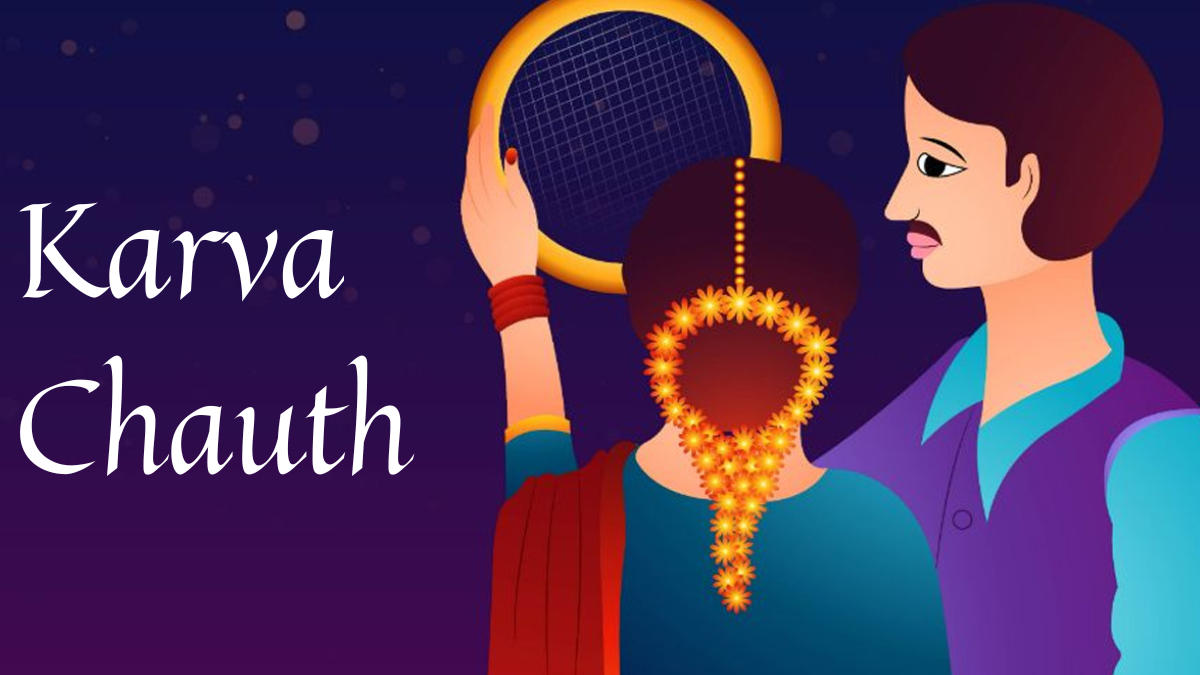Table of Contents
Karwa Chauth, also known as Karak Chaturthi (करक चतुर्थी), is a special day that celebrates strong and eternal ties between married couples. This auspicious day, Karwa Chauth 2024, is dedicated to appreciating the bond of marriage and is viewed as an occasion for women to pray for their husbands’ longevity and health. Karwa Chauth 2024 is observed on the fourth day following the full moon during the Krishna Paksha of the Kartik month, and this year Karva Chauth Date will be on October 20, 2024. The ceremony relies heavily on moon timings for breaking the fast. This year, the moon can be viewed between 19.50 hours and 21.05 hours. Read the complete blog to learn about the Karva Chauth 2024 Date, Moon Timing, Rituals, and Significance.
Karva Chauth 2024
The term ‘Karwa’ refers to an earthen pot, and ‘Chauth’ signifies the fourth. To put the ‘Karwa’ into context, women offer ‘Argya’ to the moon on the fourth day of Kartik month with an earthen pot. This festival celebrates marriage by having women fast during the Nirjala Vrat, which begins at daybreak and ends when the moon is spotted in the evening. Women assemble with earthen pots known as Karwa to execute the rite of offering water to the moon, which represents their dedication and the end of their fast.
Karwa Chauth is more than simply a fast; it is a celebration of love, commitment, and spiritual devotion. Karwa Chauth 2024 is a wonderful blend of tradition, love, and faith, in which women demonstrate their devotion to their husbands via a day of fasting and prayer. The celebration has developed throughout time, incorporating both traditional and modern features, but its central message remains unchanged: an enduring link of love and respect between married couples.
Karva Chauth Date 2024
Karwa Chauth, one of India’s most cherished Hindu festivals for married women, will be held on Sunday, October 20, 2024. The event is held on Krishna Paksha Chaturthi in the month of Kartik according to the Purnimant calendar, or in Ashwin according to the Amanta calendar used in Gujarat, Maharashtra, and southern India. Check out the Karva Chauth Date and Timing in the table below.
| Event | Day/Date |
| Karwa Chauth Puja Muhurat Duration |
05:46 PM to 07:03 PM
|
| Karwa Chauth Upavasa Time Duration |
06:27 AM to 07:53 PM
|
| Krishna Dashami Moonrise |
07:53 PM, on Karwa Chauth Day
|
| Chaturthi Tithi Begins |
06:46 AM on Oct 20, 2024
|
| Chaturthi Tithi Ends |
04:16 AM on Oct 21, 2024
|
Karwa Chauth 2024 Date and Time (Puja Muharat)
Karwa Chauth will be held on October 20, 2024. According to Drik Panchang, the festival’s timing is as follows: Karwa Chauth Puja Muhurat 05:46 PM – 07:02 PMDuration: 1 hour 16 minutes.
Fasting Time for Karwa Chauth 2024
Karwa Chauth Upavasa. According to Drik Panchang, the time begins at 06:25 AM on October 20th and ends at 07:54 PM. So, the overall fast duration is 13 Hours 29.
Karva Chauth 2024 Moon Importance
The moon plays a central role in Karwa Chauth, a traditional festival celebrated by Hindu women, especially in North India. This festival is marked by fasting and prayers for the long life and well-being of their husbands. Here’s why the moon is important:
Symbol of Completion:
On Karwa Chauth, the moon is seen as the final and divine entity that completes the day’s fast. Women begin their fast at sunrise and break it only after sighting the moon in the evening. The moon’s appearance signifies the completion of the fasting ritual.
Spiritual Significance:
In Hindu tradition, the moon is often associated with Chandra Dev, the lunar deity who represents peace, calmness, and emotional balance. Offering prayers to the moon is believed to invoke these qualities, ensuring a harmonious and prosperous married life.
Ritualistic Importance:
Once the moon rises, women view it through a sieve or a piece of cloth, symbolizing the filtering of desires and obstacles. They then look at their husbands through the same sieve, signifying their prayers for the husband’s well-being. This act is symbolic of removing all negativity and bringing blessings.
Lunar Influence:
The moon’s phases are considered to influence human emotions and behaviors, and fasting until the moonrise is thought to harness the positive energy and blessings associated with the lunar presence.
Overall, the moon in Karwa Chauth signifies not just the end of a fast, but also the connection to divine energy and the well-being of loved ones, particularly husbands.
Moon Timing of Karva Chauth 2024
The moon sighting is an important event on Karwa Chauth since the fast can only be broken after seeing the moon. Women eagerly await the moonrise to make their offerings and end their day-long fast. The moon’s sighting time varies depending on location, so check actual local timings closer to the day. Karva Chauth 2024 Moon Timing can’t always match as expected, however, it is expected that the moon will be visible in most locations this year between 19.50 and 21.05 hours.
Karva Chauth 2024 Celebration
Married women in West and North Indian States such as Punjab, Haryana, Rajasthan, Uttar Pradesh, Delhi, and others celebrate this auspicious day of Karva Chauth 2024 on the fourth day after the full moon in the month of Kartik, according to the Hindu calendar. On this day, women rise up early, bathe, dress, and eat Sargi, a pre-dawn meal typically prepared by their mothers-in-law.
After sunrise, they observe a day-long fast and refrain from drinking water. Women keep the fast by dressing up in beautiful celebratory garments, usually red, which represents auspiciousness, marriage, and love. They wear their best jewelry and bangles and apply mehendi. In the evening, women gather to perform Karwa Chauth ceremonies together. When the moon appears in the evening, people pray to it and offer Arghya. Following that, the husbands help their wives break their fast by providing them with water and food.
Karva Chauth History and Significence
History of karva chauth
Karwa Chauth is a traditional Hindu festival, predominantly celebrated in North India, where married women fast for the well-being, prosperity, and longevity of their husbands. The origins of this festival are not definitively traceable but are linked to several mythological stories and historical contexts:
Mythological Origins:
One of the popular tales is that of Queen Veeravati, who was deeply devoted to her husband. While fasting for his long life, she fainted out of hunger, and her brothers tricked her into breaking the fast by creating a fake moon. Upon breaking her fast prematurely, her husband died, but through her dedication and prayers, she revived him. This story emphasizes the power of a wife’s devotion and prayers.
Historical Significance:
In ancient times, when men would go to battle or on long expeditions, their wives would pray for their safety and longevity. The fasting was seen as a way to ensure their well-being and safe return. This was particularly important for women in military communities where their husbands often faced peril.
Cultural Significance:
The term Karwa refers to a small earthen pot of water, and Chauth means the fourth day. The festival is observed on the fourth day after the full moon (Purnima) in the month of Kartik (October-November). The ritual of using the Karwa symbolizes health and prosperity.
Traditionally, the fasting was also seen as a way to strengthen the bonds between families and within communities, as women would come together, share stories, and perform rituals.
Significance of Karwa Chauth
Devotion and Love:
Karwa Chauth is primarily a festival that celebrates the bond between husband and wife. Women fast from sunrise to moonrise without even drinking water to show their dedication to their husbands’ well-being and long life.
Strengthening Marital Bonds:
The festival is often viewed as a way to renew and strengthen the relationship between couples. Husbands also acknowledge the sacrifice made by their wives, and in modern times, some men even fast in solidarity.
Cultural Tradition:
Karwa Chauth has become a significant cultural event, where women dress in bridal attire, apply mehndi (henna), and gather for rituals. Communities come together to celebrate the festival with shared stories, songs, and traditional food after the fast is broken.
Empowerment Through Ritual:
For many women, the ritual of fasting is empowering, as it is a moment of reflection, discipline, and a display of self-control. Some also see it as a symbol of spiritual cleansing and a connection to the divine.
The festival holds a special place in Indian culture, symbolizing love, sacrifice, and the deep bond between a husband and wife. It’s a blend of spirituality, community, and personal devotion.



 CUET PG Result 2025 Soon @exams.nta.ac.i...
CUET PG Result 2025 Soon @exams.nta.ac.i...
 NEET Admit Card 2025 Release Date, How t...
NEET Admit Card 2025 Release Date, How t...
 CUET UG 2025 Vs CUET UG 2024, Check Majo...
CUET UG 2025 Vs CUET UG 2024, Check Majo...










